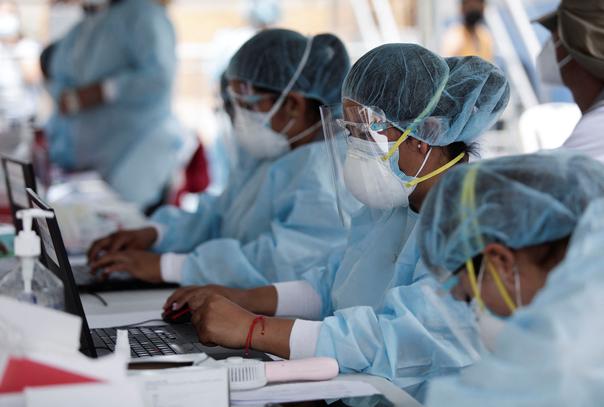"Just like previous variants, Omicron is hospitalizing people and it is killing people."
This was the stark warning against complacency from Dr. Tedros Adhanom Ghebreyesus, World Health Organization (WHO) Director General, at a press conference on 6 January.
A little over six weeks since the Omicron variant was first reported to the WHO in South Africa on 24 November, it has spread rapidly across the globe, causing what Dr. Tedros described as a 'tsunami of cases' that is overwhelming health systems.
And the pandemic is far from over. The week ending 2 January saw the highest number of cases reported since the pandemic's start, according to the WHO, and new record COVID-19 infections being reported by countries from Argentina to Israel each day.
What we know about the Omicron variant now
Omicron is less severe than the Delta variant. Janet Diaz, WHO lead on clinical management, said early studies showed there was a reduced risk of hospitalization from the variant compared with Delta. There appears also to be a reduced risk of severity in both younger and older people, but uncertainties remain.
South Africa announced on 30 December it had passed its peak of Omicron infections, without seeing a major spike in deaths.
But Dr. Tedros warned against categorizing the variant as 'mild'.
Have you read?
"Hospitals are becoming overcrowded and understaffed, which further results in preventable deaths from not only COVID-19 but other diseases and injuries where patients cannot receive timely care."
Omicron spreads quickly. In the last week of 2021, 1 in 15 people in England had COVID-19, rising to 1 in 10 in London, according to the Office of National Statistics, with Prime Minister Boris Johnson calling it the "fastest growth in COVID cases that we have ever known".
The number of people in London hospitals with COVID-19 almost quadrupled in a month, from 1,100 in early December to 4,000 in early January, the BBC reported, and 200 military personnel were deployed to help London hospitals hit by staff shortages.

And in Australia, total confirmed COVID-19 infections have passed 1 million - with more than half of these coming in the last week, according to Reuters.
COVID-19How is the World Economic Forum helping to identify new technologies to fight COVID-19?
As part of work identifying promising technology use cases to combat COVID, The Boston Consulting Group recently used contextual AI to analyze more than 150 million English language media articles from 30 countries published between December 2019 to May 2020.
The result is a compendium of hundreds of technology use cases. It more than triples the number of solutions, providing better visibility into the diverse uses of technology for the COVID-19 response.
To see a full list of 200+ exciting technology use cases during COVID – please follow this link.
The symptoms appear to be different from previous COVID-19 variants. While the main COVID-19 symptoms are still said to be cough, high temperature and loss of smell and taste, Omicron accounted for half of all cold-like illnesses in the UK, the ZOE COVID study reported in December.
The top five symptoms reported in London on the ZOE app for those testing positive for COVID-19 were runny nose, headache, fatigue, sneezing and sore throat.
Studies on animals suggest Omicron infects the upper airways more than the lungs, which could explain the different symptoms. But this has implications for children, reports Nature, who tend to be more affected by upper respiratory tract infections due to smaller nasal passages.
Do COVID-19 vaccines work against the Omicron variant?
Research continues, but one study from Imperial College London suggests the best protection comes from three COVID-19 vaccine shots, which is why countries have rolled out COVID-19 vaccination booster programmes.
Compared to the Delta variant, scientists found Omicron to evade the immune response from either previous infection or vaccination much more easily.
In December, they estimated vaccine effectiveness against symptomatic Omicron infection of between 0% and 20% after two doses of the AstraZeneca and Pfizer vaccine, and between 55% and 80% after a booster dose.
The UK Health Security Agency's chief medical adviser, Dr Susan Hopkins, told the Guardian: “I think what we’re seeing is that if you’ve had two doses more than three months ago, then it’s not going to prevent you from getting symptomatic disease.”
But it's not sustainable to administer boosters every three to six months, Patrick Vallance, Britain's chief scientific adviser, has said. The long-term view would be to settle into a "more routine type of vaccine programme".
Meanwhile, Dr. Tedros again warned that vaccine inequity across the globe risks prolonging the pandemic.
Based on the current rate of vaccine rollout, 109 countries will miss the WHO's target for 70% of the world's population to be fully vaccinated by July, he said. That aim is seen as helping end the acute phase of the pandemic.
"Booster after booster in a small number of countries will not end a pandemic while billions remain completely unprotected," Dr. Tedros said.









